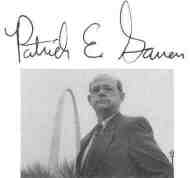A VIEW FROM METRO EAST
Local and state interests wage a fight over East St. Louis schools by Patrick E. Gauen The failures of the city's school system got national attention. What's new is the presence of 'outside troops.' The economic rebirth of the East St. Louis riverfront has been heralded often, in plans sometimes so grandiose as to evoke derisive laughter from even the city's optimists. But nobody questioned the latest plan for a hotel and entertainment center at the Mississippi River's edge. That's because the developers own the Casino Queen, which established a hot economic beachhead in a spot once deemed so improbable that the deadline for riverboat gambling licenses almost passed without anybody applying here. For the city government, the Queen represents a doubled operating budget. Mayor Gordon Bush's anthem is "Happy Days Are Here Again." His fire trucks are new, his police roster is up 50 percent and his campaign strongbox is well stocked from the Queen's largess. But there is a song of despair a few blocks across town in the headquarters of one of the state's largest school districts. Here there is no gambling windfall, just a fight between local and state interests over spending District 189's same old revenue of about $73 million. The failures of the city's school system got national attention a few years ago in Jonathan Kozol's Savage Inequalities. The local press has been onto the story much longer. What's new is the presence of outside troops — a three-member Financial Oversight Panel — sent by the same state government that several years earlier dispatched overseers to police spending at City Hall. Gov. Jim Edgar was tired of the blistering school audits and embarrassing test scores that left critics wondering whether some students were getting any education at all. Enter Richard Mark, young (40), bright, tough and already busy in his job of saving another of the impoverished city's critical resources — St. Mary's Hospital, where he is CEO. Mark was a wise choice for a white Republican governor, who selected in him a chairman with a skin tone (black) and political background (onetime protege of U.S. Rep. Jerry F. Costello, D- Belleville) to minimize howls of carpet-bagging. But there were howls nonetheless from a politicized board of education steeped in patronage, and protective of its elected autonomy. The battle reached a high pitch early this year, after Mark's group insisted on the ouster of Superintendent Geraldine Jenkins. When school board members renewed her $79,000 contract anyway, the panel fired them. Can it do that? Yes, insisted Mark. No, responded Associate Judge Robert Craig, who ruled in the school board's lawsuit that voters' choices cannot be nullified. With the case still in transit to the state Supreme Court, the General Assembly gave the panel new powers: authority to name an inspector general with subpoena powers, for example. Millions of dollars in expenditures have been questioned in recent years. There have been repeated accusations of nepotism and lax accounting systems. Some classrooms lack teachers. Meanwhile, two-thirds or more of tenth graders were failing standard math and reading exams. To the extent that dollars matter, the Casino Queen's economic Renaissance left the schools in the Dark Ages. The state shares gambling taxes with cities but not school districts. But the immediate issue in District 189 has less to do with money available than the way it's used. The oversight panel recently chastised the school board because it had $5 million in the bank to fix crumbling schools but spent less than half. School board members repeatedly point out that they — not Mark and Co. — were elected to run the schools. But the state is adamant about protecting both the school aid dollars and the 12,000 students. The attitude of local defiance was much the same back when the state put oversight strings on its bailout loan to the city several years ago. Fresh revenue from the casino eased that tension. The local versus state control issue has erupted here from time to time, thankfully limiting itself in modern years to heated oratory. Back in 1878, East St. Louis had two rival police departments — one chartered by the city and the other by the state. Their dispute over who got to use the police station was settled with a bloody gunfight in the street that left two men dead. Patrick E. Gauen covers Illinois politics for the St. Louis Post-Dispatch. Illinois Issues September 1996 ¦ 41 |
||||||||||||||

